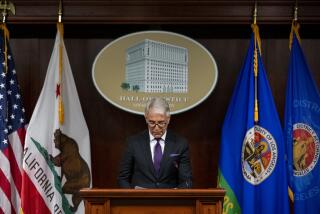Duncan Details Destroyed Enron Data
- Share via
HOUSTON — Former Arthur Andersen auditor David B. Duncan testified Friday that the files he shredded last fall as the leader of the Enron Corp. audit team consisted of “extraneous” material, including outdated financial records, copies and old research.
Duncan, in his fifth and final day on the witness stand in Andersen’s obstruction of justice trial, said the documents he destroyed amounted to a 1-foot-tall stack he turned over to his assistant for disposal last fall. He said he also spent an hour or so deleting Enron-related e-mail from his computer.
Duncan’s testimony under cross-examination marked the first time he has specified the documents he destroyed after Enron notified Andersen that it had received a letter of inquiry from the Securities and Exchange Commission. Federal prosecutors have not indicated which records they believe the firm destroyed or whether they were sought by the SEC.
In questioning Duncan, Andersen lawyer Rusty Hardin appeared to be trying to show that Duncan didn’t destroy crucial files.
Andersen is fighting an obstruction of justice charge for shredding documents related to its audit of Enron. Duncan, 43, has pleaded guilty to a separate obstruction charge and is cooperating with the government’s probe.
Hardin has contended that the accountant agreed to plead guilty because of government pressure and not because he believed he committed a crime. But during final questioning by prosecutors Friday, Duncan denied that he had been coerced.
Under cross-examination, Duncan said he could not recall specific information he intended to keep from the SEC. But he said he asked his assistant to dispose of files knowing that “all of the information in any of the documents I destroyed would not be available.”
Hardin ended his examination of Duncan, considered the prosecution’s key witness, with a daylong effort to convince the jury that the firm had retained a far greater number of documents than it had destroyed. After a sometimes bitter exchange with prosecutors outside the jury’s presence, Andersen’s legal team also received permission to show the panel 21 boxes of documents they said Duncan had preserved.
Under the obstruction statute, the destroyed documents do not have to be considered crucial in order to convict the defendant.
The accountant, a 20-year Andersen veteran, also recounted the day last fall when he directed subordinates in the firm’s Houston office to shred documents. Duncan said he called a meeting Oct. 23 of partners and managers on the Enron audit team and instructed them to comply with Andersen’s document retention policy, which requires executives to retain work papers needed to back up their accounting reasoning and to destroy drafts, copies and other documents deemed unnecessary unless there is a threat of litigation or a subpoena.
Duncan said he had never before called a meeting to instruct employees about the policy. But he said the discussion of the policy occupied just a small part of the 30-minute meeting, which he characterized as a “pep talk” for Andersen auditors who felt discouraged by the intensifying meltdown of Enron.
Duncan said he told his team that “we believed we had done everything appropriately” in dealing with Enron’s accounting and told them not to do “anything more or less than comply” with the policy’s requirements.
Duncan also said he was not thinking about Andersen’s past audit failures when he decided to order the shredding.
Prosecutors have contended that the firm’s previous run-ins with the SEC served as a motive to keep Enron records from regulators.
Duncan earlier testified that he had been prompted to destroy records in part by an Oct. 12 e-mail from Andersen lawyer Nancy Temple. But Duncan said he initially didn’t act on the e-mail, acting instead after listening to an analyst conference call in which criticism of Enron intensified.
Also Friday, tensions remained from a shouting match that erupted Thursday between Hardin and U.S. District Judge Melinda Harmon.
After Harmon sustained one in a string of objections from prosecutors, Hardin started to complain. The judge asked him and prosecutors to convene at the bench to discuss the legal point. Hardin hesitated.
“Nothing good ever happens up there,” he remarked before joining in the whispered conversation.
When the lawyers finished their questions, Harmon told Duncan he could leave the witness stand.
“For good?” asked the accountant, who is the subject of dozens of Enron-related lawsuits.
“For this trial,” Harmon replied.
More to Read
Inside the business of entertainment
The Wide Shot brings you news, analysis and insights on everything from streaming wars to production — and what it all means for the future.
You may occasionally receive promotional content from the Los Angeles Times.










